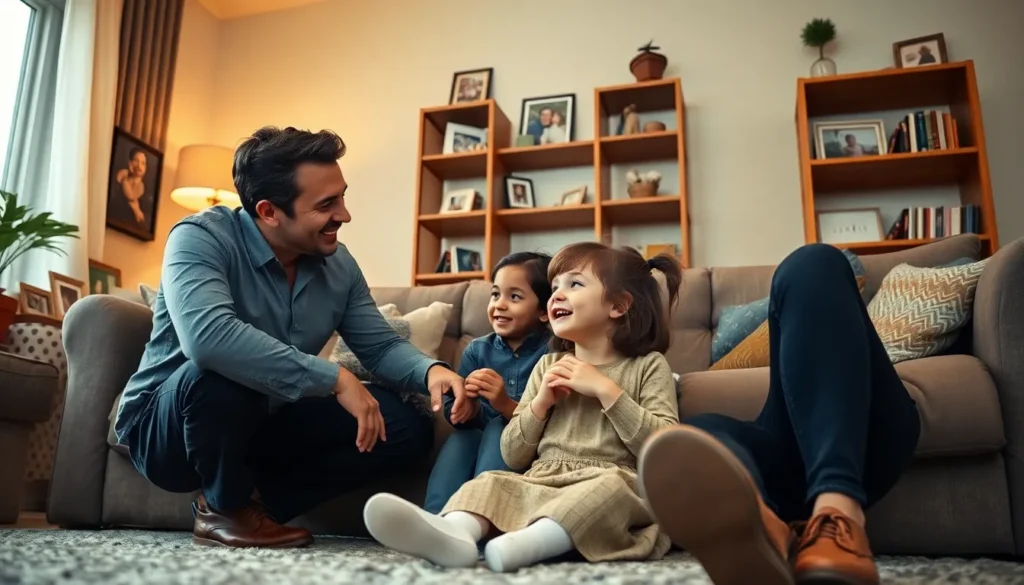Table of Contents
ToggleEver noticed how movies often reflect the intricacies of parenting? Sometimes, you might find yourself nodding along as a character navigates the delightful chaos of raising kids. Among the various styles depicted, authoritative parenting stands out like a beacon of hope, turning potential disaster into heartfelt moments. This style, blending warmth with structure, is not only compelling but can also be a potent teaching tool. Let’s jump into some sweet, funny, and eye-opening examples of authoritative parenting in films, proving that even in Hollywood, good parenting is all about balance.
Understanding Authoritative Parenting

Authoritative parenting is a nurturing yet disciplined approach that blends responsiveness with high expectations. This style emphasizes clear communication, emotional support, and established rules. Parents practicing authoritative tactics also encourage independence while maintaining structure in their children’s lives. Tough love is employed here, with both rewards and consequences being key components.
Core Characteristics of Authoritative Parenting
At the heart of authoritative parenting are some positive traits:
- Open Communication: Children feel heard and understood, fostering trust.
- High Expectations: Expectations are set, ensuring children strive for excellence while knowing they’re supported.
- Independence Encouraged: Kids are guided to make their own choices, helping them grow into self-sufficient adults.
- Emotional Support: Parents validate their children’s feelings, teaching empathy and emotional literacy.
While this style sounds stellar, why is it so important in movies? Let’s find out.
Importance of Authoritative Parenting in Film
Movies have a unique way of exploring parenting styles, often emphasizing the challenges and triumphs of parent-child relationships. Authoritative parenting commonly appears in films as it showcases a balanced approach that resonates well with audiences. This style highlights the complexity of raising children, conveying messages about the importance of guidance paired with nurturing.
Seeing characters embody authoritative parents enables viewers to reflect on their own upbringing or take notes on effective parenting strategies. When children are raised in supportive environments that also demand responsibility, they tend to flourish. That’s why these films resonate deeply and often become cultural touchstones.
Examples of Authoritative Parenting in Movies
Here are some standout films that feature authoritative parenting in action, demonstrating its effectiveness in shaping fulfilling family dynamics.
The Pursuit of Happyness
In this inspiring film, Chris Gardner, played by Will Smith, embodies authoritative parenting as he struggles to provide for his son, Christopher. Even though facing immense hardships, he combines unwavering support with valuable life lessons, encouraging his son to dream big and work hard. This emotional journey highlights the resilience found in authoritative parenting.
Finding Nemo
In “Finding Nemo,” Marlin, a clownfish, showcases authoritative parenting while navigating the dangers of the ocean to find his son, Nemo. Throughout their adventure, Marlin sets boundaries, expressing concern for Nemo’s safety. But, he learns to balance his protective instincts with the need to allow his son the freedom to explore and grow, showcasing a prototype of authoritative parenting.
Inside Out
“Inside Out” gives a fascinating glimpse into the emotional life of a young girl, Riley. Her parents, especially her mother, demonstrate authoritative parenting through their supportive yet structured approach. They’re attentive to her emotional needs, helping Riley understand and navigate her feelings, which eventually promotes her emotional development, an ideal situation for fostering healthy emotional intelligence.
Little Miss Sunshine
This quirky family road trip comedy encapsulates the essence of authoritative parenting through the character of Sheryl Hoover. As the mother, she provides both love and encouragement while setting expectations for her children. The film beautifully portrays how family support and guidance help children thrive, even amidst chaos and quirky life situations.
Lessons from Authoritative Parenting in Movies
The depiction of authoritative parenting in films offers valuable lessons for both parents and children. Here are some key insights:
Impact on Children’s Development
Children raised by authoritative parents tend to develop strong self-esteem and better emotional regulation. They learn vital decision-making skills and how to handle disappointment in a constructive manner. Films showcasing this parenting style often illustrate how love and discipline work hand in hand, equipping children with the tools for successful adult life. These characters can inspire conversations about emotional intelligence and resilience, vital components for thriving in today’s complex world.
Cultural Depictions and Variations
The representation of authoritative parenting varies across cultures but shares core values of nurturing and guidance. Different films reflect local parenting norms while still emphasizing universal principles like love, support, and expectation. Movies from various countries often explore traditional versus modern parenting styles, showcasing how cultural contexts shape family dynamics. This exploration can help viewers appreciate the nuances of parenting portrayed in film.







